人教版七年级英语下册Unit7_单元主题思维导图
七年级下册英语一到六单元作文思维导图
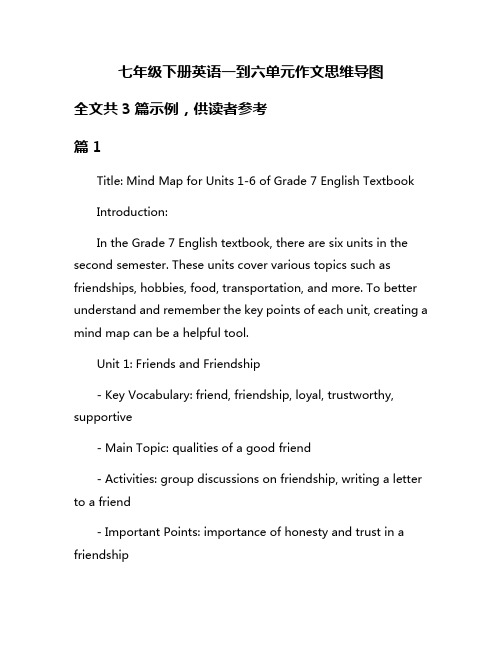
七年级下册英语一到六单元作文思维导图全文共3篇示例,供读者参考篇1Title: Mind Map for Units 1-6 of Grade 7 English TextbookIntroduction:In the Grade 7 English textbook, there are six units in the second semester. These units cover various topics such as friendships, hobbies, food, transportation, and more. To better understand and remember the key points of each unit, creating a mind map can be a helpful tool.Unit 1: Friends and Friendship- Key Vocabulary: friend, friendship, loyal, trustworthy, supportive- Main Topic: qualities of a good friend- Activities: group discussions on friendship, writing a letter to a friend- Important Points: importance of honesty and trust in a friendshipUnit 2: Hobbies and Interests- Key Vocabulary: hobby, interest, passion, pastime- Main Topic: different hobbies people enjoy- Activities: creating a poster about a favorite hobby, presenting hobbies to the class- Important Points: exploring new hobbies, finding something one is passionate aboutUnit 3: Food and Eating Habits- Key Vocabulary: food, diet, nutrition, healthy, junk food- Main Topic: healthy eating habits- Activities: planning a healthy meal, discussing the benefits of a balanced diet- Important Points: importance of eating nutritious food for overall healthUnit 4: Transportation- Key Vocabulary: transportation, vehicle, commute, public transport- Main Topic: different modes of transportation- Activities: creating a presentation on eco-friendly transportation options, discussing transportation challenges in the city- Important Points: impact of transportation on the environment, importance of sustainable transportation choicesUnit 5: Environmental Issues- Key Vocabulary: environment, pollution, recycling, conservation, ecosystem- Main Topic: environmental problems and solutions- Activities: organizing a clean-up activity in the community, researching ways to reduce waste- Important Points: understanding the importance of protecting the environment for future generationsUnit 6: Celebrations and Traditions- Key Vocabulary: celebration, tradition, custom, festival, holiday- Main Topic: different cultural celebrations around the world- Activities: presenting about a traditional holiday in a chosen country, discussing the significance of rituals and traditions- Important Points: learning about and respecting diverse cultural practicesConclusion:Creating a mind map for the units 1-6 of the Grade 7 English textbook can help students organize and remember key information more effectively. By visually representing the main topics, vocabulary, and activities of each unit, students can improve their understanding of the English language and related topics. Mind mapping can be a useful study tool for students to enhance their learning experience.篇2Unit 1: Best FriendsIntroduction: Best friends are special people who play a significant role in our lives. Having a best friend is like having a sister or brother you never had. It's someone you can trust, rely on, and have fun with. In this unit, we learn about the importance of friendship and how to be a good friend.Main Points:1. Qualities of a good friend: Someone who is supportive, understanding, loyal, and trustworthy.2. Activities to do with a best friend: going shopping, watching movies, sharing secrets, etc.3. How to resolve conflicts with a friend: communication, compromise, and forgiveness.4. The importance of being a good listener and offering support when a friend is in need.Unit 2: School LifeIntroduction: School is where we spend most of our time during the week. It's essential to have a positive attitude towards school and education. In this unit, we talk about the different aspects of school life and how to excel academically.Main Points:1. Subjects we study in school: math, science, English, history, etc.2. Extracurricular activities: sports, music, drama, debate club, etc.3. Study tips: time management, taking notes, asking questions, and seeking help when needed.4. Importance of attending classes regularly and participating actively in discussions.Unit 3: My HobbiesIntroduction: Hobbies are activities we enjoy doing in our free time. They help us relax, de-stress, and express ourselves creatively. In this unit, we share our favorite hobbies and why we love them.Main Points:1. Different types of hobbies: sports, arts and crafts, reading, cooking, etc.2. Benefits of having a hobby: mental stimulation, relaxation, building skills, and making new friends.3. How to develop a new hobby: trying out different activities and finding what interests you the most.4. Sharing your hobbies with others and learning from their experiences.Unit 4: Our HomeIntroduction: Home is where we feel safe, comfortable, and loved. It's a place where we create memories with our family and friends. In this unit, we talk about the importance of home and how to create a warm and welcoming environment.Main Points:1. Different rooms in a house: living room, kitchen, bedroom, bathroom, etc.2. Activities we do at home: cooking, cleaning, watching TV, spending time with family, etc.3. Importance of having a clean and organized home: promoting harmony, reducing stress, and fostering creativity.4. How to be a responsible member of the household: helping with chores, respecting others' spaces, and communicating effectively.Unit 5: Our CommunityIntroduction: A community is a group of people living in the same area who share common interests and goals. We are all part of a community, whether it's our neighborhood, school, or city. In this unit, we learn about the importance of being an active member of our community.Main Points:1. Ways to contribute to our community: volunteering, participating in events, supporting local businesses, etc.2. Benefits of a strong community: building relationships, fostering a sense of belonging, and promoting social cohesion.3. Issues facing our community: pollution, poverty, crime, etc.4. How to address these issues: raising awareness, organizing fundraisers, and working together to find solutions.Unit 6: Protecting the EnvironmentIntroduction: The environment is essential for our health and well-being. It's our responsibility to take care of the Earth and protect it for future generations. In this unit, we talk about the importance of environmental conservation and how we can make a difference.Main Points:1. Environmental issues: global warming, deforestation, air and water pollution, etc.2. How our actions impact the environment: recycling, reducing waste, conserving energy, etc.3. Ways to protect the environment: planting trees, cleaning up litter, advocating for eco-friendly practices, etc.4. Importance of raising awareness about environmental conservation and encouraging others to take action.Conclusion: In conclusion, the topics covered in the seventh-grade English curriculum have helped us develop a better understanding of ourselves, our relationships, and the world around us. By applying the knowledge and skills we've learned, we can become more compassionate, responsible, and informed individuals. Let's continue to grow and make a positive impact on our communities and the environment.篇3Title: Mind Map for Seventh Grade English Unit 1-6Introduction:This mind map is designed to summarize and organize key information from the first six units of the seventh grade English curriculum. It includes vocabulary, grammar, reading comprehension, and writing skills covered in these units. By using this mind map as a study tool, students can easily review and reinforce their English language skills.Unit 1: Personal Information- Vocabulary: family members, personal belongings, daily routine- Grammar: present simple tense, possessive pronouns, describing people- Reading: introducing oneself, talking about hobbies and interests- Writing: writing a short paragraph about oneselfUnit 2: School Life- Vocabulary: school subjects, classroom objects, school activities- Grammar: prepositions of place, imperatives, present continuous tense- Reading: describing school routines, talking about favorite subjects- Writing: writing a letter to a pen pal about school lifeUnit 3: Friends and Relationships- Vocabulary: feelings and emotions, personality traits, friendship- Grammar: comparatives and superlatives, past simple tense, linking words- Reading: discussing qualities of a good friend, describing personal experiences- Writing: writing a dialogue between two friends about a conflictUnit 4: Health and Lifestyle- Vocabulary: healthy habits, food and drink, sports and exercise- Grammar: should and shouldn't, modals for advice and suggestions, frequency adverbs- Reading: discussing the importance of physical activity, giving healthy eating tips- Writing: writing a blog post about staying healthy and fitUnit 5: Travel and Leisure- Vocabulary: means of transportation, travel destinations, leisure activities- Grammar: future tense, past continuous tense, question forms- Reading: planning a trip, describing a recent vacation- Writing: writing a travel diary entry about a memorable tripUnit 6: Environment and Sustainability- Vocabulary: environmental issues, recycling, renewable energy sources- Grammar: passive voice, reported speech, conditional sentences- Reading: discussing ways to protect the environment, analyzing the impact of human activities- Writing: composing a persuasive essay on the importance of conservationConclusion:This mind map provides a comprehensive overview of the key concepts and skills covered in the first six units of the seventh grade English curriculum. By using this tool, students can enhance their understanding of the English language and improve their writing, reading, listening, and speaking abilities. Additionally, this mind map can serve as a valuable resource for teachers and parents to support students in their English language learning journey.。
七下英语第七单元知识点归纳作文只思维导图

七下英语第七单元知识点归纳作文只思维导图Learning a new language can be a challenging yet rewarding experience. Each unit in a language curriculum is designed to introduce students to a specific set of vocabulary, grammar rules, and communication skills. In the case of the 7th grade English curriculum, Unit 7 covers a range of important knowledge points that build upon the foundation established in previous units.One of the key focus areas in Unit 7 is the expansion of vocabulary related to various topics. Students are introduced to a diverse set of words that can be used to discuss subjects such as travel, transportation, the environment, and technology. This not only enhances their overall language proficiency but also enables them to engage in more meaningful and nuanced conversations.Another crucial aspect of Unit 7 is the reinforcement and refinement of grammatical concepts. Students delve deeper into the complexities of sentence structure, verb tenses, and subject-verbagreement. By mastering these grammatical principles, they can communicate their ideas more effectively and accurately.In addition to vocabulary and grammar, Unit 7 also emphasizes the development of reading and writing skills. Students are exposed to a variety of text genres, from informative articles to creative narratives. They learn strategies for comprehending and analyzing these texts, while also honing their own writing abilities through exercises in composition and essay writing.Furthermore, Unit 7 places a strong emphasis on oral communication skills. Students engage in dialogues, role-play scenarios, and group discussions to practice their listening and speaking abilities. This not only enhances their confidence in using the language but also helps them develop crucial interpersonal skills.One of the unique features of Unit 7 is the integration of cultural elements. Students explore the customs, traditions, and perspectives of English-speaking countries, gaining a deeper understanding and appreciation for the diversity of the language. This cultural awareness not only enriches their language learning experience but also fosters a more well-rounded global perspective.Another important aspect of Unit 7 is the incorporation of technology-based learning resources. Students are introduced tovarious digital tools and platforms that can enhance their language acquisition. From interactive language learning apps to online language exchanges, these technological resources provide students with engaging and innovative ways to practice and improve their English skills.Throughout Unit 7, the curriculum also emphasizes the importance of critical thinking and problem-solving skills. Students are encouraged to analyze information, draw conclusions, and apply their language skills to real-world scenarios. This not only strengthens their language proficiency but also develops essential cognitive abilities that can be applied across various academic and professional domains.Finally, Unit 7 reinforces the importance of continuous learning and personal growth. Students are encouraged to set language learning goals, reflect on their progress, and develop strategies for ongoing improvement. This cultivates a growth mindset and instills a lifelong appreciation for language learning.In conclusion, the knowledge points covered in Unit 7 of the 7th grade English curriculum are comprehensive and multifaceted. From expanding vocabulary and refining grammatical skills to developing reading, writing, and oral communication abilities, this unit equips students with a robust foundation in the English language.Additionally, the integration of cultural awareness, technology-based learning, critical thinking, and personal growth further enhances the overall language learning experience. By mastering the knowledge points in Unit 7, students can confidently navigate the challenges of language acquisition and unlock a world of opportunities for personal and academic growth.。
人教版七年级下英语各单元主题思维导图

初中英语人教版七年级下
Unit2 What time do you go to school?
单元主题思维导图
Daily routines
日常作息习惯
对话篇 ng job Radio station What time…?
Scott:
12:00 —6:00
Interviewer: What time…get up?
Scott:
at 8:30
breakfast at 9:00
Interviewer: a funny time
Scott: Interviewer:
Scott:
exercise at 10:20
When do you go to work? 11:00/ never late for work
sports club
What…can you play?
soccer
join the soccer club
be good at tell story story telling club
like to draw
join two clubs
Let’s join now!
What can they do?
阅读篇 SectionB-2b
Place
The old people’s home The Student’s Sports Center
Requirements
Contact
Be free in July
Be _g_o__o_d_w__i_th__ old people
Can talk to them and play games with them
doesn’t like to get up early eating breakfast quickly having _h_a_m_b_u_r_g_e_r_s for lunch
全新人教版七年级下英语主题思维导图集
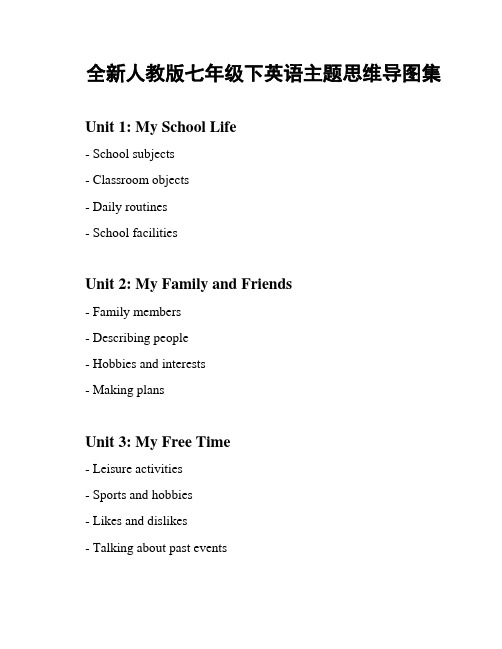
全新人教版七年级下英语主题思维导图集Unit 1: My School Life- School subjects- Classroom objects- Daily routines- School facilitiesUnit 2: My Family and Friends- Family members- Describing people- Hobbies and interests- Making plansUnit 3: My Free Time- Leisure activities- Sports and hobbies- Likes and dislikes- Talking about past eventsUnit 4: My Home- Rooms and furniture- Describing a house- Daily chores- Talking about future plansUnit 5: My City- Asking for ns- Places in the city- Modes of n- Giving ns about a cityUnit 6: My Daily Routine - Time and daily activities- Describing daily routines- Talking about habits- Expressing preferencesUnit 7: My Clothes- Clothing items- Colors and patterns- Describing outfits- Shopping for clothesUnit 8: My Food- Food and drinks- Describing tastes- Ordering food in a restaurant - Talking about food preferencesUnit 9: My Health- Parts of the body- Describing ailments- Giving advice- Talking about healthy habitsUnit 10: My Holidays- Holiday activities- Talking about past ns- Making travel plans- Describing a dream holiday以上是《全新人教版七年级下英语》的主题思维导图集,帮助学生系统地了解和掌握每个单元的主题内容。
新人教版七下英语Unit知识点图文稿
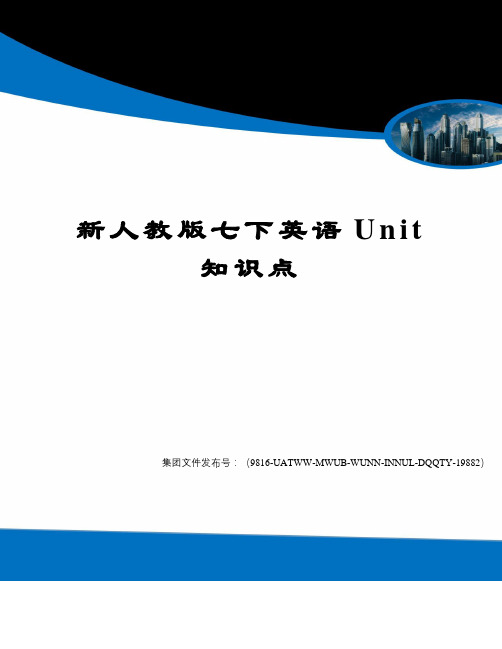
新人教版七下英语U n i t知识点集团文件发布号:(9816-UATWW-MWUB-WUNN-INNUL-DQQTY-19882)七年级(下)英语Unit7-9知识点班级:姓名:Unit 7 It’s raining!◆短语归纳1. not bad 不错2. at the park 在公园3. take a message for …为……捎个口信4. have a good time / have a great time / have fun / enjoy oneself 过得很愉快5. call sb. back 给某人回电话6. no problem 没问题7. right now 现在8. talk on the phone 通过电话交谈9. some of ………当中的一些10. by the pool 在游泳池边11. drink orange juice 喝橙汁12. study hard 努力学习13. on a vacation 在度假14. in the mountains 在山里15. call sb. 给某人打电话16. write to sb. 给某人写信17. right for…适合…… 18. 给……拍一张照片◆用法集萃◆典句必背1. How’s the weather天气怎么样2. It’s cloudy. / It’s sunny. / It’s raining. 天气多云。
/ 天气晴朗。
/ 天正下雨。
3. How’s it going情况怎么样4. Great! / Not bad. / Terrible! 好极了!/ 不错。
/ 糟糕!5. Can I take a message for him 我给他捎个口信好吗1. tell sb. (not) to do sth. 告诉某人(不要)做某事6. I’m having a great time visiting my aunt in Canada.我正在加拿大愉快地拜访我的姨妈7. My family and I are on a vacation in the mountains. 我和我的家人正在山里度假。
七年级下册英语人教版第七单元作文思维导图
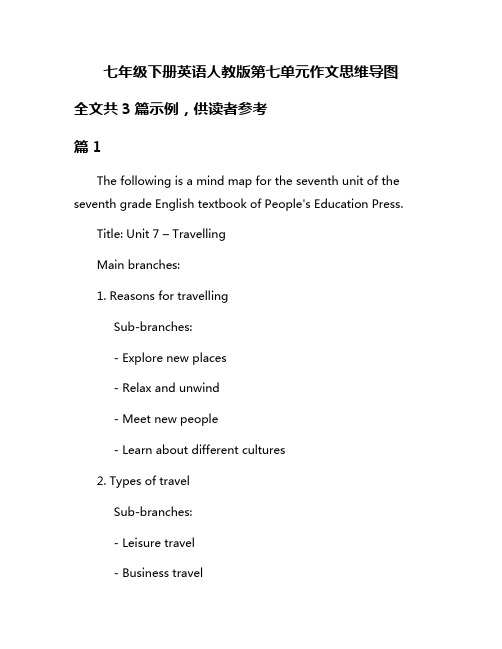
七年级下册英语人教版第七单元作文思维导图全文共3篇示例,供读者参考篇1The following is a mind map for the seventh unit of the seventh grade English textbook of People's Education Press.Title: Unit 7 – TravellingMain branches:1. Reasons for travellingSub-branches:- Explore new places- Relax and unwind- Meet new people- Learn about different cultures2. Types of travelSub-branches:- Leisure travel- Business travel- Adventure travel- Educational travel3. Travel essentialsSub-branches:- Passport and visa- Money and budgeting- Transportation- Accommodation- Packing list4. Popular travel destinationsSub-branches:- Beach destinations- Historical landmarks- Natural wonders- Urban metropolises 5. Travel tipsSub-branches:- Research before you go- Pack light- Stay safe- Respect local customs- Enjoy the journey6. Personal travel experiencesSub-branches:- Memorable trips- Funny travel stories- Lessons learned from travelling7. Future travel plansSub-branches:- Dream destinations- Bucket list experiences- Travel goalsThis mind map provides a comprehensive overview of the key topics covered in Unit 7 of the seventh grade English textbook. From reasons for travelling to travel essentials, populardestinations, travel tips, personal experiences, and future plans, this unit aims to deepen students' understanding of the world of travel and inspire them to explore new horizons. By engaging with these topics in a fun and interactive way, students can improve their English language skills while broadening their cultural knowledge and global awareness. Travel is not just about going places; it's about experiencing new things, meeting new people, and expanding your worldview. So pack your bags and get ready for an exciting journey through the world of travel!篇2The seventh unit of the People's Education Edition English textbook in the seventh grade focuses on various topics related to communication and travel. In this unit, students learn vocabulary and grammar structures related to making plans, giving directions, and discussing travel experiences. To help students better understand and organize the information in this unit, a mind map can be a useful tool.The mind map for the seventh unit of the People's Education Edition English textbook can be structured as follows:1. Main topic: Communication and Travel2. Subtopics:- Making Plans- Vocabulary: schedule, appointment, plan, prepare- Grammar: present simple for future arrangements, be going to for intentions- Example sentences:- We have a meeting on Saturday at 3 p.m.- I'm going to visit my grandparents next weekend.- Giving Directions- Vocabulary: direction, left, right, straight ahead, turn- Grammar: imperatives for giving directions- Example sentences:- Go straight ahead until you reach the traffic lights.- Turn left at the next intersection.- Discussing Travel Experiences- Vocabulary: trip, journey, adventure, explore- Grammar: past simple for recounting past events- Example sentences:- Last summer, I went on a trip to Paris.- We explored the ancient ruins of Machu Picchu.3. Practice Exercises:- Fill in the blanks with the appropriate vocabulary words- Complete sentences using the correct grammar structures- Write a short paragraph describing a recent travel experienceBy creating a mind map for the seventh unit of the People's Education Edition English textbook, students can visually see how the different topics are interconnected and reinforce their understanding of the material. This tool can also help students review and study more effectively for exams or quizzes. Overall, using a mind map can enhance students' learning experience and make learning English more engaging and interactive.篇3Title: Mind Map for Unit 7 in Grade 7 English TextbookIntroduction:In Grade 7 English, students are exposed to various topics related to everyday life, social issues, and personal experiences. In this unit, students learn about different aspects of the environment, including pollution, conservation, and the importance of protecting our planet. Through reading, writing, listening, and speaking activities, students develop their language skills and deepen their understanding of environmental issues.Main Ideas:1. Pollution- Types of pollution: air, water, and soil pollution- Causes of pollution: industrial activities, vehicle emissions, and improper waste disposal- Consequences of pollution: health problems, biodiversity loss, and climate change- Solutions to pollution: reduce, reuse, recycle, and support environmentally-friendly practices2. Conservation- Importance of conservation: preserving natural resources, protecting wildlife, and maintaining ecological balance- Conservation efforts: national parks, wildlife reserves, and sustainable development projects- Individual actions: saving water, energy conservation, and reducing waste- Benefits of conservation: clean air, clean water, and sustainable living3. Environmental Activism- Role of environmental activists: raising awareness, advocating for policy changes, and promoting sustainable practices- Examples of environmental campaigns: plastic-free initiatives, tree planting drives, and clean-up activities- Impact of environmental activism: influencing government policies, mobilizing communities, and inspiring change4. Green Living- Sustainable living practices: using eco-friendly products, reducing carbon footprint, and supporting green businesses- Benefits of green living: healthier lifestyle, cost savings, and reduced environmental impact- Challenges of green living: limited availability ofeco-friendly products, higher cost of sustainable options, and resistance to change- Tips for green living: conserve energy, recycle waste, and support local sustainable initiativesConclusion:Unit 7 in Grade 7 English textbook provides students with valuable knowledge and skills to address environmental challenges and make a positive impact on the planet. By understanding the causes and consequences of pollution, the importance of conservation, the role of environmental activism, and the benefits of green living, students can become responsible global citizens who contribute to a more sustainable future. Through engaging activities and meaningful discussions, students develop critical thinking skills, language proficiency, and a sense of environmental stewardship. Let's work together to protect our planet and create a cleaner, greener world for future generations.。
人教版七年级英语下册Unit7_单元主题思维导图

Unit7 It’s raining!
单元主题思维导图
Rick
Rick ______. The e’s__. He’s at__. Can I
Sure, no problem.
对话篇 SectionA 2d
Steve
It’s Steve. How’s____. I’m with at . Is your brother _____? Could you just_____?
What’s is he/she doing? He’s studying at his friend’s home. She’s skating. What are you/they doing? I’m cooking./They are watching TV.
How’s the weather in …? It’s sunny/cloudy …
The weather and activities
Activities
cook, visit friends, sit by the pool, skate, make a snowman
Expressing what you are doing
单元整体话题篇
Seasons and the weather Nouns: rain, snow, summer, winter Adjectives: windy, cloudy, sunny, dry, cold, hot, warm, snowy
Talking about the weather
阅读篇 SectionB-2b
Where
(1)__________
Su Lin
Weather
七年级下册英语全册思维导图

七年级下册英语全册思维导图Unit 1: These are my teachers.•Vocabulary–school subjects–teachers–classroom objects–adjectives to describe people•Grammar–subject pronouns and possessive pronouns–using ‘be’ to describe people and things–using ‘have’ to show possession–asking and answering questions using ‘wh-’ words•Skills–introducing people–talking about school subjects and teachers–describing people–asking and answering questions about possessionUnit 2: This is my school.•Vocabulary–places in a school–prepositions of place–numbers 1-1000–adverbs of frequency•Grammar–using ‘there is’ and ‘there are’–using the verb ‘have’ with objects and rooms–using prepositions to describe location–forming questions with ‘where’ and giving answers•Skills–talking about your school–giving directions in a school–describing locations–asking and answering questions about places Unit 3: How do you study for a test?•Vocabulary–school activities and supplies–adverbs of manner–adjectives to describe actions–time expressions•Grammar–using present simple tense to talk about routines and habits–using adverbs of manner to describe how things are done–using adjectives to describe actions–using time expressions to talk about frequency •Skills–talking about daily routines–discussing how to study for a test–describing actions using adjectives–expressing frequency using adverbsUnit 4: I love learning English!•Vocabulary–adjectives describing feelings–types of music–activities–opinions•Grammar–using present continuous tense to talk about actions happening now–using ‘like’, ‘love’, ‘enjoy’ to talk about hobbies and activities–using adjectives to describe feelings–expressing opinions using ‘I think’, ‘I believe’•Skills–talking about hobbies and activities–expressing likes and dislikes–describing feelings–giving opinionsUnit 5: How’s the weather?•Vocabulary–weather conditions–seasons–types of clothing•Grammar–using present simple tense to talk about weather–using ‘it’ to refer to the weather–using prepositional phrases to describe weather conditions•Skills–talking about the weather–describing seasons and clothing–making predictions about the weather–giving weather forecastsUnit 6: What’s your favorite day?•Vocabulary–days of the week–activities–ordinal numbers–adjectives to describe activities•Grammar–using ‘what’ to ask about favorite things–using ordinal numbers to talk about the order of days–using adjectives to describe activities •Skills–talking about favorite activities–discussing daily routines on different days–using ordinal numbers–describing activities using adjectivesUnit 7: I want to be a basketball player.•Vocabulary–jobs–sports–school subjects related to jobs–adjectives to describe jobs•Grammar–using ‘want to’ to talk about future plans–using ‘be going to’ to talk about future intentions–using adjectives to describe jobs–using ‘because’ to give reasons•Skills–talking about future plans and intentions–discussing different jobs–describing jobs using adjectives–giving reasons using ‘because’Unit 8: Where’s the post office?•Vocabulary–places in a city–directions–prepositions of movement–adjectives to describe cities•Grammar–using ‘Can you…’ to ask for help–using imperatives to give instructions–using prepositions of movement to give directions–using ‘there is’ and ‘there are’ to talk about places in a city•Skills–asking for and giving directions–describing places in a city–using imperatives to give instructions–talking about different citiesUnit 9: How do you make a banana smoothie?•Vocabulary–food and drinks–kitchen utensils–imperatives for cooking–adjectives to describe food and taste •Grammar–using imperatives to give instructions for cooking–using ‘how much’ and ‘how many’ to ask about quantities–using adjectives to describe food and taste–using ‘like’ to express preferences•Skills–talking about cooking and food preferences–giving instructions for making a recipe–describing food and taste–asking about quantitiesUnit 10: I’m watching TV.•Vocabulary–activities–types of TV programs–time expressions–adjectives to describe TV programs •Grammar–using present continuous tense to talk about actions happening now未知驱动探索,专注成就专业–using adjectives to describe TV programs–using time expressions to talk about frequency •Skills–discussing TV programs and activities–talking about what is happening now–describing TV programs using adjectives–expressing frequency of activities11。
英语学习:人教版七年级下册各单元思维导图
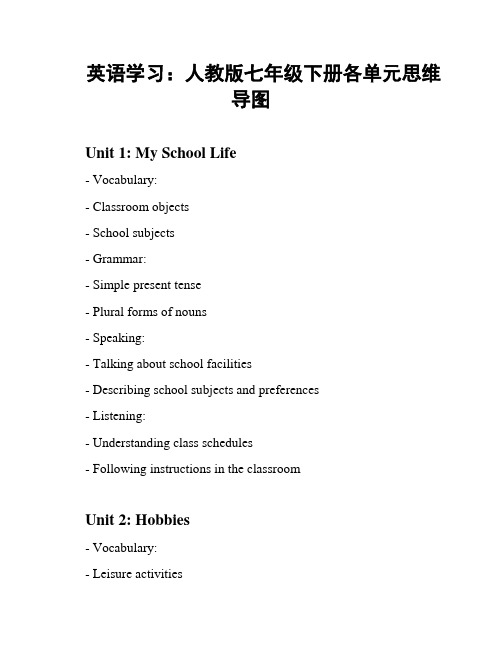
英语学习:人教版七年级下册各单元思维导图Unit 1: My School Life- Vocabulary:- Classroom objects- School subjects- Grammar:- Simple present tense- Plural forms of nouns- Speaking:- Talking about school facilities- Describing school subjects and preferences- Listening:- Understanding class schedules- Following instructions in the classroomUnit 2: Hobbies- Vocabulary:- Leisure activities- Sports and games- Grammar:- Present continuous tense- Adverbs of frequency- Speaking:- Talking about hobbies and interests- Discussing preferences and dislikes- Listening:- Understanding conversations about hobbies- Following instructions for games and activitiesUnit 3: At Home- Vocabulary:- Rooms and furniture- Daily routines- Grammar:- Present simple tense- Prepositions of place- Speaking:- Describing rooms and houses- Talking about daily routines- Listening:- Understanding conversations about household chores - Following instructions for recipes and tasksUnit 4: Food and Drink- Vocabulary:- Types of food and drinks- Quantifiers- Grammar:- Countable and uncountable nouns- How much/How many- Speaking:- Talking about food preferences- Ordering food at a restaurant- Listening:- Understanding conversations about meals and recipes - Following instructions for cooking and servingUnit 5: Family and Friends- Vocabulary:- Family members- Personal pronouns- Grammar:- Possessive adjectives- Wh-questions- Speaking:- Introducing family members- Describing relationships- Listening:- Understanding conversations about family activities- Following instructions for interviews and introductionsUnit 6: At the Zoo- Vocabulary:- Animals and their characteristics- Adjectives to describe animals- Grammar:- There is/are- Speaking:- Talking about animals and their habitats- Listening:- Understanding conversations about zoo visits - Following directions for finding animalsUnit 7: The Weather- Vocabulary:- Weather conditions- Seasons and months- Grammar:- Present continuous for future arrangements - Adjectives to describe weather- Speaking:- Talking about weather in different seasons - Making plans based on weather forecasts- Listening:- Understanding weather reports- Following instructions for outdoor activitiesUnit 8: Holidays- Vocabulary:- Festivals and celebrations- Holiday activities- Grammar:- Past simple tense- Time expressions- Speaking:- Talking about past holidays and celebrations- Describing holiday traditions- Listening:- Understanding conversations about holiday experiences - Following instructions for crafts and gamesUnit 9: Around Town- Vocabulary:- Places in a city- Directions and locations- Grammar:- Imperatives- Giving and following directions- Speaking:- Asking for and giving directions- Describing places in a city- Listening:- Understanding conversations about city attractions - Following directions to different locationsUnit 10: Health and Fitness- Vocabulary:- Body parts and health issues- Sports and exercises- Grammar:- Present continuous for future arrangements- Imperatives for instructions- Speaking:- Talking about health and fitness routines- Giving advice on healthy habits- Listening:- Understanding conversations about health problems - Following instructions for exercises and workouts。
人教版七年级下册UnitUnit7-unit12单元知识点复习
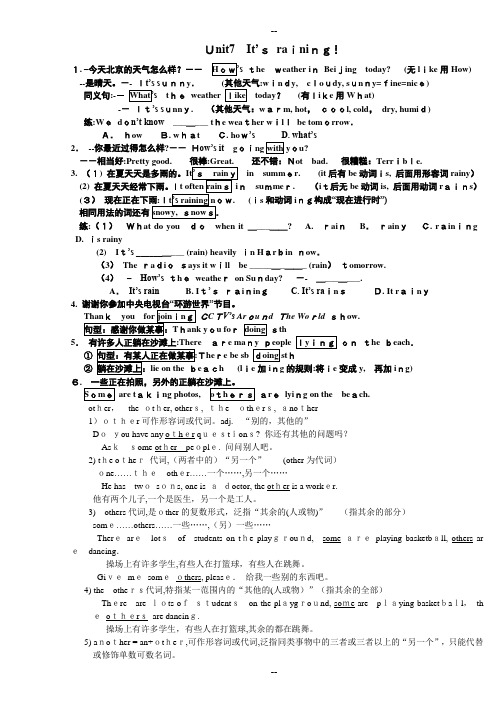
Unit7 It’sraining!1. –今天北京的天气怎么样?--theweather inBeijing today? (无like用How) --unny.:windy,cloudy, sunny=fine=nice)同义句:--thetoday?(有like用What)--It’s sunny. (其他天气:warm, hot,cool, cold,dry, humid) 练:Wedon’t know_______ the weather willbe tomorrow.A.how B. what C. how’s D. what’s2.--你最近过得怎么样?--How’s it goiou?--相当好:Pretty good. 很棒:Great. 还不错:Not bad. 很糟糕:Terrible.3. (1) in summer. (it后有be动词is, 后面用形容词rainy)(2) summer.(it后无be动词is, 后面用动词rains)(3)(is和动词ing构成“现在进行时”)练:(1)What do youdowhen it ______? A.rainB.rainyC. rainingD. is rainy(2)It’s __________ (rain) heavily in Harbin now.(3)The radiosays it will be __________ (rain)tomorrow.(4)–How’s theweatheron Sunday? --________.A.It’s rain B. It’sraining C. It’s rainsD. It rainy4. ”节目。
CCTV’s Around The Worldshow.ou forsth5.are maonthe beach.①There be sb h②each (lie加ing的规则:将ie变成y,再加ing)6are taking photos,arelying on the beach.other,the other, others, theothers, another1)other可作形容词或代词。
人教版新目标七年级下学期unit7it27sraining知识点
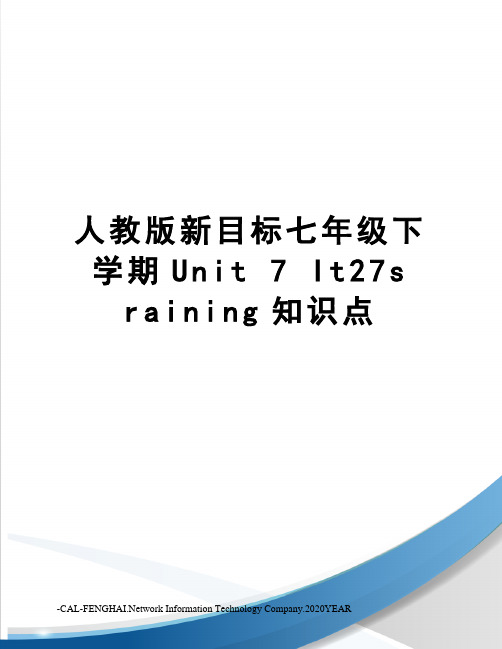
人教版新目标七年级下学期U n i t7I t27s r a i n i n g知识点work Information Technology Company.2020YEARUnit 7 It’s raining知识点总结1. rain (1)n(不可数). 雨水 There is a lot of in summer.(seasons: spring, summer, autumn/fall, winter)(2)v. 下雨 It a lot in summer.2. How’s the weather=What’s the weather lik e 天气怎么样?答语:It’s +描述天气的形容词/v-ing.描述天气的形容词:wind→windy多风的cloud→cloudy多云的rain→rainy 多雨的snow→snowy下雪的sun→sun ny晴朗的 fog→fog gy有雾的e.g. How’s the weather like in Zhengzhou? =It’s fine/sunny/cloudy/rainy/raining.3. 感叹句(1)What+名词性短语(+主语+谓语)! What a fine day it is today!(2)How+adj/adv(+主语+谓语)! How fine it is today!________ a happy family!________ good weather/news!_______ beautiful the garden is!_______ hard he studies!4. How’s it g oing(with sb/sth)近来情况怎样进展如何=How’s everything going?答语:Great/Pretty good/Not bad/Terrible/Just so-so!e.g. ---How is it going your study---Great!5. cook (1)v. 做饭 My mother often cooks (dinner) for us.(2)n.厨师 I want to be a great cook in the future.(注意:cooker 厨具)6. message“信息,消息”可数名词。
初中英语《Module7Feelingsandimpressions》单元教学设计以及思维导图
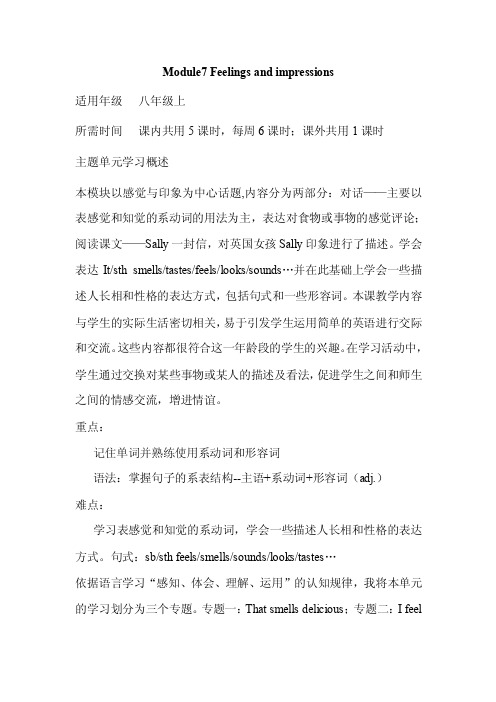
Module7 Feelings and impressions适用年级八年级上所需时间课内共用5课时,每周6课时;课外共用1课时主题单元学习概述本模块以感觉与印象为中心话题,内容分为两部分:对话——主要以表感觉和知觉的系动词的用法为主,表达对食物或事物的感觉评论;阅读课文——Sally一封信,对英国女孩Sally印象进行了描述。
学会表达It/sth smells/tastes/feels/looks/sounds…并在此基础上学会一些描述人长相和性格的表达方式,包括句式和一些形容词。
本课教学内容与学生的实际生活密切相关,易于引发学生运用简单的英语进行交际和交流。
这些内容都很符合这一年龄段的学生的兴趣。
在学习活动中,学生通过交换对某些事物或某人的描述及看法,促进学生之间和师生之间的情感交流,增进情谊。
重点:记住单词并熟练使用系动词和形容词语法:掌握句子的系表结构--主语+系动词+形容词(adj.)难点:学习表感觉和知觉的系动词,学会一些描述人长相和性格的表达方式。
句式:sb/sth feels/smells/sounds/looks/tastes…依据语言学习“感知、体会、理解、运用”的认知规律,我将本单元的学习划分为三个专题。
专题一:That smells delicious;专题二:I feelnernous when I speak Chinese;专题三:Language in use。
前者是后者的基础,后者是前者的升华,最终达成对学生综合语言运用能力的培养目标,学会用英语表达对人外貌和性格及对事物的感觉的描述。
本单元主要采用情景中学习、问题中思考、听读中输入、说写中输出、自主学习与小组合作学习相结合的学习方式。
本单元的预期学习成果:1. 听力任务完成后,学生能正确理解主要功能句的意义,模仿录音进行分角色朗读、背诵,并仿编对话。
2. 根据阅读语篇任务所建构的篇章结构,在老师引领下,学生能对文段进行复述。
人教版英语七年级下册单元Unit 7 知识点+测试卷+思维导图
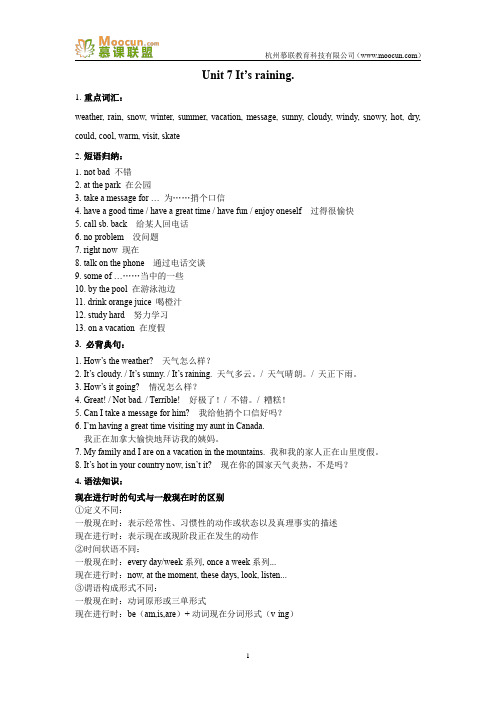
Unit 7 It’s raining.1.重点词汇:weather, rain, snow, winter, summer, vacation, message, sunny, cloudy, windy, snowy, hot, dry, could, cool, warm, visit, skate2.短语归纳:1.not bad 不错2. at the park 在公园3. take a message for … 为……捎个口信4. have a good time / have a great time / have fun / enjoy oneself 过得很愉快5. call sb. back 给某人回电话6. no problem 没问题7. right now 现在8. talk on the phone 通过电话交谈9. some of ………当中的一些10. by the pool 在游泳池边11. drink orange juice 喝橙汁12. study hard 努力学习13. on a vacation 在度假3. 必背典句:1. How’s the weather? 天气怎么样?2. It’s cloudy. / It’s sunny. / It’s raining. 天气多云。
/ 天气晴朗。
/ 天正下雨。
3. How’s it going? 情况怎么样?4. Great! / Not bad. / Terrible! 好极了!/ 不错。
/ 糟糕!5. Can I take a message for him? 我给他捎个口信好吗?6. I’m having a great time visiting my aunt in Canada.我正在加拿大愉快地拜访我的姨妈。
7. My family and I are on a vacation in the mountains. 我和我的家人正在山里度假。
人教版英语七年级下册单元Unit 7 知识点+测试卷+思维导图

Unit 7 It’s raining.1.重点词汇:weather, rain, snow, winter, summer, vacation, message, sunny, cloudy, windy, snowy, hot, dry, could, cool, warm, visit, skate2.短语归纳:1.not bad 不错2. at the park 在公园3. take a message for … 为……捎个口信4. have a good time / have a great time / have fun / enjoy oneself 过得很愉快5. call sb. back 给某人回电话6. no problem 没问题7. right now 现在8. talk on the phone 通过电话交谈9. some of ………当中的一些10. by the pool 在游泳池边11. drink orange juice 喝橙汁12. study hard 努力学习13. on a vacation 在度假3. 必背典句:1. How’s the weather? 天气怎么样?2. It’s cloudy. / It’s sunny. / It’s raining. 天气多云。
/ 天气晴朗。
/ 天正下雨。
3. How’s it going? 情况怎么样?4. Great! / Not bad. / Terrible! 好极了!/ 不错。
/ 糟糕!5. Can I take a message for him? 我给他捎个口信好吗?6. I’m having a great time visiting my aunt in Canada.我正在加拿大愉快地拜访我的姨妈。
7. My family and I are on a vacation in the mountains. 我和我的家人正在山里度假。
人教版七年级英语下册Unit7SectionB(2a-2c)课件
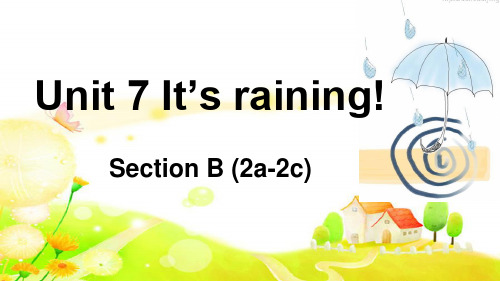
Europe mountain
country skate
snowy winter Russian
snowman rainy
n. 欧洲 n. 高山 n. 国;国家 v. 滑冰 adj. 下雪的 n. 冬天;冬季 adj. 俄罗斯的 n. 俄罗斯人;俄语 n. 雪人 adj. 阴雨的;多雨的
A: How’s the weather in Picture …? B: It’s… . A: What is he/ she doing?
Unit 7 It’s raining!
Section B (2a-2c)
1. 能记住并能正确运用下列词汇: visit,
教 Canada, summer, sit, juice, soon, vacation, on a 学 vacation, hard, Europe, mountain, country 目 2.能运用阅读技巧进行语篇阅读,获取信息 标
Careful reading ___
Finish the mind map.
Dave’s vacation
where ___H__e_’_s__h_a__v_i_n_g__a__g_r__e_a_t__t_im__e__i_n__E__u_r__o_p_e__.___
__ Dave and his family are on a vacation in
6.给……写信 __w_r_i_te__to__s_b_________
根据所给汉语完成下列英语句子,每空一词。
1. 我正坐在泳池边喝橙汁。
I’m
_s_i_tt_isnitting_g__
by
the
pool
and drinking
人教版七年级英语下册Unit1-12单元复习思维导图

B: It’s sunny.
A: What is the weather like in Beijing?
B:
It’s sunny.
2021/1/22
Ask for what people are doing.
A: What are you/ they doing? B: I’m cooking./ They are watching TV. A: What’s she/ he doing? B: She/ He’s visiting friends.
1)a chicken 一o只th鸡er food
chicken 鸡肉
rice, bread, porridge, hamburgers, noodles, dumplings, cakes, soup, salad, Ice-cream, tofu…
Daily activitie
s
Adverbs of frequency
Unit 2 Daily routines
Time s
How to ask the time
A: What time do you usually get up? B: I usually get up at six thirty. A: What time does Rick eat breakfast? B: He eats breakfast at seven o’clock. 2021/1/22A: When does Scott go to work? B: He always goes to work at eleven o’clock.
curly hair straight hair long hair short hair a round face big eyes a small mouth thin heavy tall short be of medium height be of medium build
初中英语《Unit7How much are these socks》单元教学设计以及思维导图
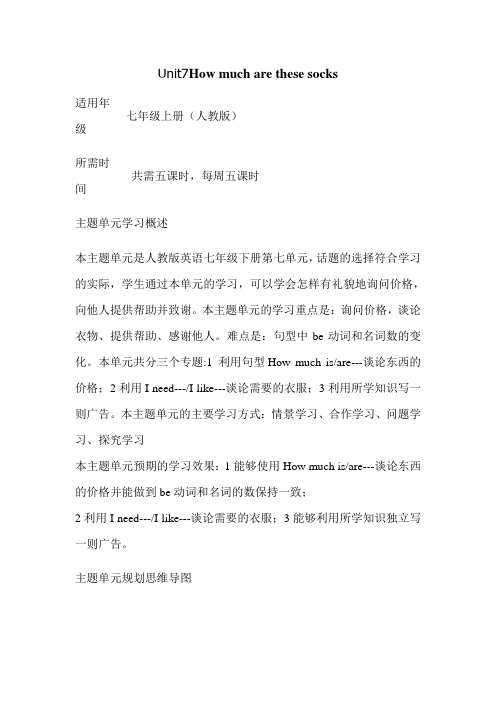
Unit7How much are these socks适用年七年级上册(人教版)级所需时共需五课时,每周五课时间主题单元学习概述本主题单元是人教版英语七年级下册第七单元,话题的选择符合学习的实际,学生通过本单元的学习,可以学会怎样有礼貌地询问价格,向他人提供帮助并致谢。
本主题单元的学习重点是:询问价格,谈论衣物、提供帮助、感谢他人。
难点是:句型中be动词和名词数的变化。
本单元共分三个专题:1 利用句型How much is/are---谈论东西的价格;2利用I need---/I like---谈论需要的衣服;3利用所学知识写一则广告。
本主题单元的主要学习方式:情景学习、合作学习、问题学习、探究学习本主题单元预期的学习效果:1能够使用How much is/are---谈论东西的价格并能做到be动词和名词的数保持一致;2利用I need---/I like---谈论需要的衣服;3能够利用所学知识独立写一则广告。
主题单元规划思维导图主题单元学习目标(知识与技能:1.熟练掌握关于衣物和数字等的词汇。
2.掌握本单元句型的意义和用法。
语言技能目标:1.能听懂关于询问价格的对话;2.能用How much is/are---谈论东西的价格,表达自己喜欢什么衣服,并能询问对方的需要;3.能读懂包含价格的短文。
4.能用所学知识写出广告与他人交流。
情感态度与价值观:有礼貌地询问价格向他人提供帮助,培养自主学习的能力。
过程与方法:情景导入学习、合作与探究学习对应课标(说明:学科课程标准对本单元学习的要求)1.能听懂关于询问价格的对话;2.能用How much is/are---谈论东西的价格,表达自己喜欢什么衣服,并能询问对方的需要3.能读懂包含价格的短文。
4.能用所学知识写出广告与他人交流。
主题单元问题设计 1 How much is the hat /are these pants? 2 What do you need? 3Write an ad for your own clothes.专题划分专题一How much is the hat /are these pants? ( 2 课时)专题二:What do you need? ( 2 课时)专题三:Write an ad for your own clothes. ( 1 课时)其中,专题三作为研究性学习专题一 .专题一How much is the hat /are these pants? ( 2 课时)所需课时2课时每周5课时专题学习目标1.语言知识目标:能够听说读写和衣物有关的单词:sock T-shirt shorts sweater big small clothes2.能用How much is/are---谈论东西的价格,表达自己喜欢什么衣服,并能询问对方的需要;3.能读懂包含价格的短文。
- 1、下载文档前请自行甄别文档内容的完整性,平台不提供额外的编辑、内容补充、找答案等附加服务。
- 2、"仅部分预览"的文档,不可在线预览部分如存在完整性等问题,可反馈申请退款(可完整预览的文档不适用该条件!)。
- 3、如文档侵犯您的权益,请联系客服反馈,我们会尽快为您处理(人工客服工作时间:9:00-18:30)。
In Europe
Where
cool (4)_________
Writing to Jane (5)__________ In the mountains
Weather
Dave
Activities
语法篇-现在进行时与一般现在时的区别
用法上的区别
一般现在时 现在进行时
描述经常发生的动作或存在的状态。 描述现在正在发生的动作或存在的状态。
阅读篇 SectionB-2b
Where
(1)__________
Su Lin
Weather
Warm Sunny
Activities
(2)__________ Studying English (3)__________ Sitting by the pool and drinking orange juice
单元整weather Nouns: rain, snow, summer, winter Adjectives: windy, cloudy, sunny, dry, cold, hot, warm, snowy
Talking about the weather
初中英语人教版七年级下
Unit7 It’s raining!
单元主题思维导图
Rick
Rick ______. The . What ___?
Sounds like He’s__. He’s at__. Can I
Sure, no problem.
对话篇 SectionA 2d
Steve
It’s Steve. How’s____. I’m with at . Is your brother _____? Could you just_____?
How’s the weather in …? It’s sunny/cloudy …
The weather and activities
Activities
cook, visit friends, sit by the pool, skate, make a snowman
Expressing what you are doing
现在进行时与一 般现在时的区别
结构上的区别
一般现在时
主语+be+表语 主语+行为动词+其他
现在进行时 主语+be+现在分词+其他
标志词的区别
一般现在时
every day, on Sundays, on weekends, often, usually, sometimes等。
现在进行时 now, at the moment以及“Look!”或“Listen!”等
